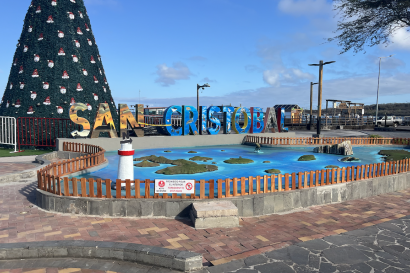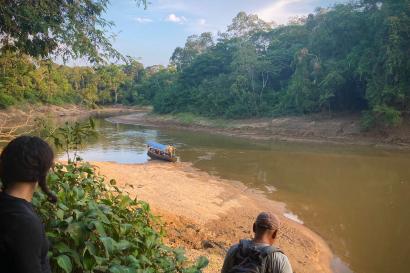
One of my most meaningful experiences during my semester abroad in Quito has been my service learning placement at Extreme Response, an international organization whose Quito site involves an after-school program for kids whose parents work tirelessly sorting trash and recyclables in Quito’s dump. I originally decided to take IES Abroad’s Service Learning class because I wanted to experience different aspects of Ecuadorian culture, not simply the tourist attractions. I recognize that as a student studying abroad for a mere four months, I am technically a tourist. Having said that, I knew I wanted to get more out of my time here than simply exploring the city and the surrounding natural parks. I wanted to immerse myself fully within the culture—the enticing and difficult aspects—in order to better understand the daily lives of Quiteños (people from Quito, Ecuador’s capital).
As I have said previously, my goal in coming to Ecuador was not simply to have fun, but rather to learn about another culture that is distinct from my own experience growing up in the United States. Little did I know that Ecuador is, in fact, splattered with a variety of indigenous cultures (around 14 different nationalities) like paint on a Jackson Pollock canvas. From the Quichua communities in the Andes to the Huaorani and Achuar communities of the Ecuadorian Amazon, four months abroad does not even allow me to begin to uncover the rich cultural heritage spread throughout the geographically small but ethnically immense country of Ecuador. Because there is so much to experience, however, and because I have always thrived by offering my time and energy to work with local communities to improve living conditions, I opted to spend 80 hours of my semester abroad working with the 30 kids who feel blessed to call Extreme Response a second home. From serving lunch and washing dishes to helping with homework and playing jump rope, my Tuesdays and Thursdays have been filled with love, laughter, and learning for the past 14 weeks.
As my time with these heartfelt children winds down, I’ve begun to think back over our 3+ months together, realizing in the process that these kids have helped me as much as I hope I have helped them. As often happens with international service programs, volunteers tend to go into the experience believing—often unbeknownst to them—that they are in some way superior to the local community with whom they are working. I have to say that even though I tried my best to ignore it, I too succumbed to this disheartening idea during my first few weeks at Extreme Response. I felt as though these kids needed someone to take care of them as their parents couldn’t fully do, someone to tell them everything would be okay (even though I didn’t know if it would be)—someone like me.
Luckily, as I have been reflecting on my experience these past few months, I have come to realize that those feelings I felt so strongly at the beginning were results of the “white savior complex” trying to overtake my desire to offer support and guidance—the things the kids I have been working with truly need. They aren’t looking for some young white woman to act as a mother: they already have parents using their hard-earned money to send them to school. They don’t want some young white woman teaching them about U.S. culture to give them a respite from the difficulties of their childhood—Ecuadorian culture is a beautiful thing in and of itself, something to be embraced rather than disgraced. They are simply looking for someone to shower them with love in the form of daily hugs, someone to play with them throughout the afternoon, and someone to listen to what they have to say without offering solutions—in other words, a friend who simply cares about their well-being. That is who I have been for these kids and who they have been for me.
As I have spent time talking to them about their days at school and what they want to be when they grow up, they have listened to me practice my Spanish and talk about my own childhood. I may have taught them a few words in English, but they have also done their fair share of teaching me phrases in Spanish. From the smiles on their faces, I know I have brought a little bit more joy to their lives as they have clearly brought God’s love to my own life these past few months. Tomorrow is sadly my last day with them, but I will thank them for brilliantly shining as God’s light to the world. Everyone can always use a little more laughter, a few more hugs, and a bigger smile as they go about their daily lives—I feel blessed to truthfully say these kids have brought each of these aspects to my life abroad, filling me with hope and peace for the future of this planet.
For those of you planning to study abroad, and those of you who simply yearn to travel, I highly recommend researching sustainable volunteer organizations that will allow you to learn more about other cultures through service while also forcing you to reflect on your own life experiences and beliefs. My service learning course has taught me that (as with all things in life) there are structural issues with all volunteer organizations, especially those that work FOR local communities, rather than WITH them. Having said that, volunteering is an incredible opportunity to learn more about life’s beautiful offerings while working to improve the quality of life of different people around the world (including your own). So, enjoy your traveling experiences, enjoy learning about the cultural beauty of the Earth, and most of all, enjoy the knowledge that by working WITH people to improve the structural flaws of the world’s communities, we are respecting the similarities and differences of all living beings.

Julianna Connelly
<p>I love writing, specifically about the relationship between humans and the environment. Not only have I written a number of self-help articles, but I have also written (and plan to write many more) poems about this crucial topic. Because the environment is very important to me and creative writing is one of my passions, I find that putting the two together keeps me happy, satisfied, and feeling both empowered and capable of changing other people's opinions about their relationship to the world around them.</p>






